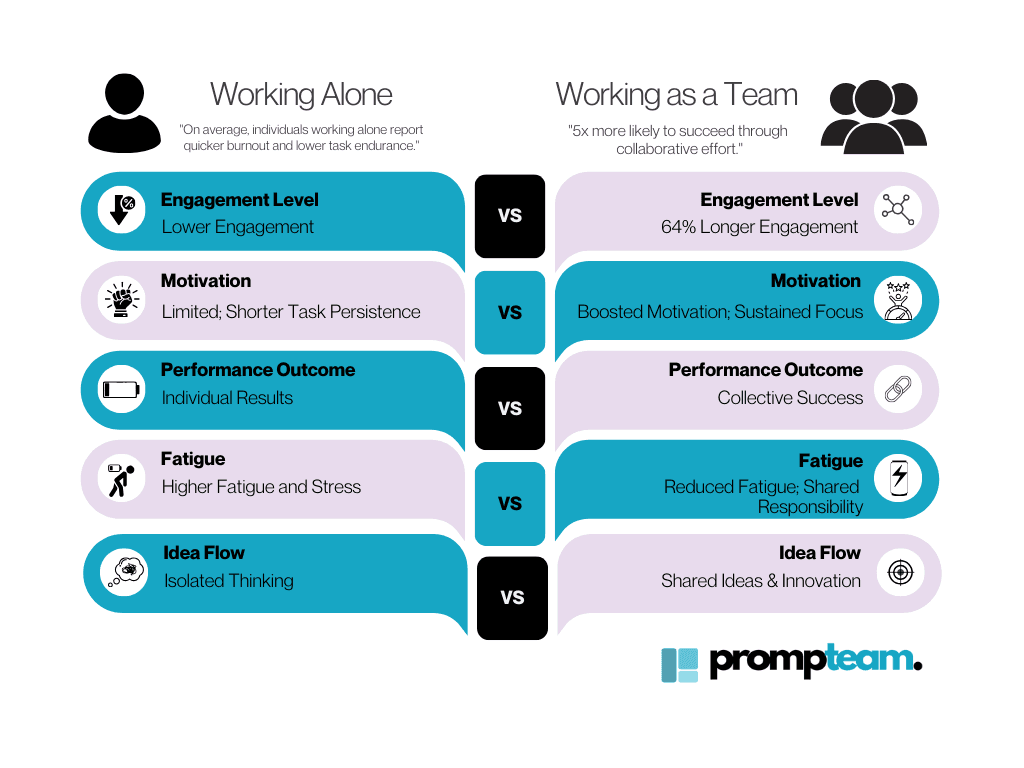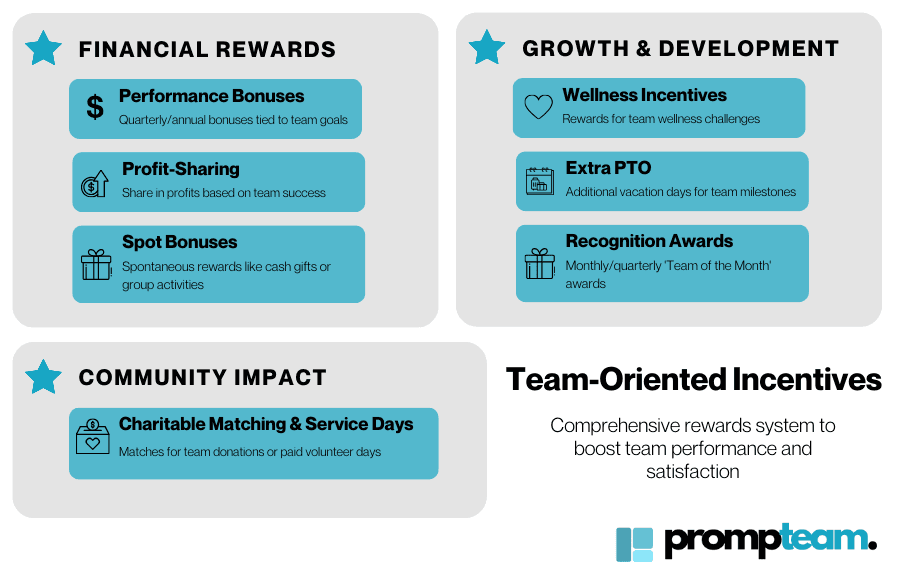
Motivation and Performance Boost: One Benefit to Working Collaboratively on a Team
What is one benefit of working collaboratively on a team?
A Stanford study revealed that even the perception of working collaboratively can significantly enhance motivation. Participants who felt part of a team worked 64% longer on tasks, reported higher engagement, experienced less fatigue, and achieved better results than those working alone.
Remarkably, this boost in motivation continued for several weeks, underscoring the lasting power of a collaborative mindset.
Top One Benefit to Working Collaboratively on a Team

Working Alone vs. Working as a Team
Collaboration Fuels High Performance
A study by the Institute for Corporate Productivity (i4cp) and Rob Cross at Babson College found that companies emphasizing collaboration are five times more likely to be high-performing.
However, the study revealed a critical factor: simply aspiring to be collaborative isn’t enough; successful partnership requires a sense of purpose.
Teams perform best when collaboration is aligned with shared goals and values, fostering a strong organizational commitment.
How to Design the Right Environment for Collaboration
For collaboration to thrive, the workplace culture and structure must be supported. Key elements include:
Clear, accessible information
Invite input from multiple perspectives.
Physical spaces or virtual platforms that facilitate teamwork enhance engagement.
Incentives often focus on individual achievements, but rewarding team successes encourages sustained collaborative behavior.
Kevin Martin, Chief Research Officer at i4cp, notes that a lack of rewards for teamwork is a major barrier to effective collaboration.
When companies recognize and reward team-based accomplishments, they’re more likely to see ongoing partnerships contributing to overall success.
The Role of Incentives in Collaboration
Research shows that people are more likely to collaborate when incentives are involved. Offering rewards can shift mindsets from “every person for themselves” to “mutual benefit.”
This shared incentive fosters trust, making collaboration sustainable and resilient—even during tough economic times.
Here are practical examples of team-oriented incentives:

Examples of team-oriented incentives
Check out 5 Most Popular Collaboration Software| Are they worth your money?
The Importance of Culture in Fostering Collaboration
During economic downturns, people often default to competitive, “zero-sum” thinking. Research from the World Values Survey has shown that recessionary pressures can reduce collaboration as individuals become more self-focused.
Cultivating a collaborative culture is crucial to countering this tendency. It ensures that teamwork and mutual support remain core values—even when external pressures might otherwise drive people toward individual gains.
Other Benefits of Working Collaboratively on a Team
Continuous Learning and Skill Development
Each team member has unique strengths and areas of expertise. By working together, team members gain new insights and skills, learning from each other's successes, approaches, and mistakes.
This shared growth benefits individuals and strengthens the team, making it more adaptable to new challenges.
Increased Efficiency and Productivity
Collaborative work allows tasks to be divided and handled according to individual strengths, improving outcomes' speed and quality.
Responsibilities can be shared, reducing bottlenecks and making it easier to meet deadlines. When everyone contributes according to their strengths, the team can accomplish more in less time.
Improved Communication and Stronger Relationships
Effective teamwork builds trust, respect, and open communication.
Working together towards shared goals fosters a sense of camaraderie and mutual support. Even if team members aren't close friends, collaborating on projects in a respectful, understanding environment often boosts morale and job satisfaction, creating a positive workplace culture.
Reduced Stress Through Shared Responsibility
A collaborative environment can alleviate individual stress by distributing workloads across the team. Having a support network makes coping and finding solutions easier when challenges arise.
Knowing that others are invested in the same goals provides a sense of shared responsibility, making the process less overwhelming and more manageable.
A Collective Sense of Achievement
Finally, accomplishing goals as a team brings a unique satisfaction. When everyone contributes to a shared success, the achievement feels more significant.
Teamwork taps into our natural desire for belonging, allowing us to be part of something more significant, which can be deeply rewarding on a personal level.
The True Impact of Team Collaboration
Collaboration isn’t just about working alongside others—it’s a powerful way to boost motivation, improve productivity, and create a sense of shared accomplishment.
Research has proven that when people feel part of a team, they’re more engaged, work longer, and get better results.
For companies that want to make collaboration more manageable and more effective, collaboration tools like Prompteam.ai are worth considering.
Its Slack + ChatGPT integration provides user-friendly ways to share ideas, connect team members, and keep seamless communication, whether in-office or remotely.
Check out its top features today!
